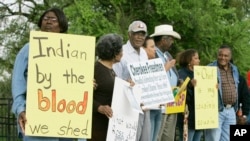A U.S. court has reinstated tribal citizenship rights for descendants of slaves once owned by the Native American Cherokee Nation.
At the end of the U.S. Civil War more than 150 years ago, the Cherokee Nation signed a treaty with the United States that guaranteed the same rights as native Cherokees for all slaves formerly held as property by the tribe, and passed down those rights to their descendants. The treaty also made clear that the slaves were free — as were all others in the United States at the time — and they became known as Cherokee Freedmen.
An appeal is possible, but if Thursday's ruling stands, descendants of the Cherokees' former slaves would have full tribal citizenship rights, including the right to run for office, vote in elections, and receive benefits such as access to tribal health care and housing.
U.S. District Judge Thomas Hogan said in his ruling, issued in Washington: "The Cherokee Nation can continue to define itself as it sees fit, but must do so equally and evenhandedly with respect to native Cherokees and the descendants of Cherokee Freedmen.''
Fewer than 3,000 Freedmen descendants are known today, but an attorney for their group has estimated there are many more who could seek tribal citizenship in the future.
'Cherokee by blood'
The Cherokees, originally headquartered in Tahlequah, Oklahoma, were one of the largest and most powerful American Indian tribes in the 19th century, and they have remained influential. They eventually revised their citizenship regulations following the 1866 treaty, but in a way that continued to exclude Freedmen's descendants unless they could prove they were "Cherokee by blood," according to tribal lists.
The issue was disputed for many years by descendants of the former slaves and Cherokee tribal officials, but a federal court ruled in 2006 that all descendants of the Freedmen had the right to full Cherokee citizenship.
The tribal administration held a special election the following year in which more than three-quarters of Cherokee citizens voted to strip the Freedmen's descendants of tribal citizenship. The issue has been litigated since then by the Cherokee Nation and groups representing the Freedmen's descendants, along with the U.S. Department of the Interior, which supervises relations between the federal government and all Native American groups.
